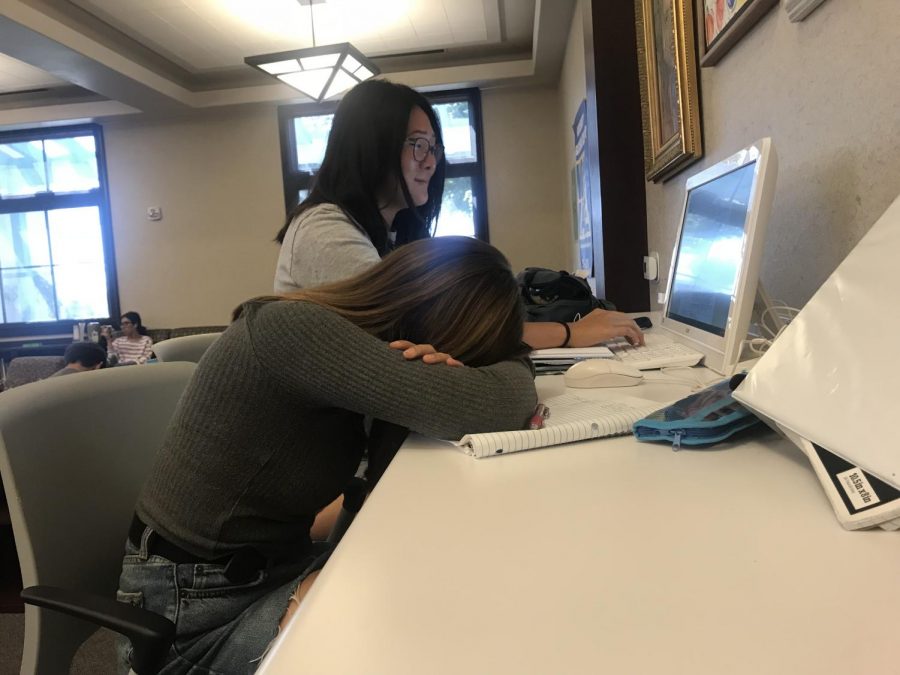Photo Illustration by Camille ZImmer
Students are not getting enough sleep, leading to them sleeping in their classes.
Vetoed Again: Students can’t sleep in
September 20, 2018
Senate Bill 328, a bill that would have required California public middle and high schools to move their start times to no earlier than 8:30am by July of 2021, was vetoed on Thursday by Gov. Jerry Brown. In an attempt to address the issue of sleep deprivation in teenagers, the legislature recently passed the bill. Some SDA students supported the bill, but others doubted the validity of such a cookie-cutter solution.
“It would be good to let us sleep in because teens need a lot of sleep. But if school ends later, kids are just gonna sleep later, so I can’t seeing this bill helping much,” sophomore Alesandra Cardella said.
Some of the concerns that SDA students had stemmed from uncertainty that students would actually be getting the recommended amount of sleep.
Tatum Smith, a junior, said “I think that 8:30 is better than our current…start time. But to really make an effective change, it’d be better to have it at 9, because then students can get their full 9 hours of sleep, like [psychology teacher] Hrzina….says all the time.”
Principal Adam Camacho said “The perception would certainly be there, the idea that you can get more sleep. But each individual and their family dynamics, their patterns, their habits — all that would have a play with how they used that extra time.”
The proponents of the bill are citing student health as a central argument. Teenagers lacking the recommended eight hours of sleep is causing concentration problems in class and health complications. “It is fundamental to put the well-being of our students first,” bill author Sen. Anthony Portantino said, “The science and results are clear; our teens are healthier and perform better when school starts later.”
However, simply making all schools move their start times back is too much of a one-size-fits-all solution for some opponents of the bill, according to the California School Boards Association (CSBA) website. “The California School Boards Association (CSBA) does not oppose later school start times, the CSBA opposes a mandate on school start times,” the CBSA website said. “Individual school boards should be able to explore whether later start times make sense for their communities…Local students, parents and teachers understand their needs better than Sacramento legislators and have the most stake in doing what’s right for children and families.”
Indeed, Brown also displayed this sentiment in his veto message. “Several schools have already moved to later start times. Others prefer beginning the day earlier. These are the types of decisions best handled in the local community,” he wrote.
SDA students had mixed views of the change. Some thought that a later start time would be great, but considering the scheduling issues, it may not be worth it.
“I’d like that, except it would be hard for me to get to work on time, which starts at 3. If you move start time the end time has to change too.” Clara Conkling, a junior, said.
In addition to work obligations, a few students are worried about how this change might affect their extracurriculars.
“I think that the 8:30 starting time would be very beneficial to students,” Mackenzie Cox, a junior, said. “However, if this would mean school would end later, that would become a problem because people have extracurricular activities.”
“Honestly I think we should just keep it the way it is, because a bunch of kids have extracurricular activities and sports going on,” sophomore Halle Schaffer said. “And these kids get home at like 7 o’clock at night anyways, so pushing this schedule back an hour won’t help them. In fact, I think it’s counterintuitive to the goal of giving students more sleep time.”
Issues with bus schedules, athletic meetings, and scheduling conflicts with parent work hours are among the list of kinks to be worked out. However, Portantino says that the logistics can be worked out to accommodate the students.
As for the changes to SDA specifically, there have been some concerns that homeroom may have to be eliminated, or lunch shortened to make sure students are able to go to their after school activities.
Camacho stated that like many schools, SDA was just watching to see where the bill went. If the bill had been approved, administration would “have to look at our entire bell schedule…to make sure we have a 240 instructional minute minimum for every student,” he said.
“We have to look at start and end times and how far that extends into the afternoon, and what conflicts is that going to produce with other things like sports, the bus schedules, public transportation…it might seem okay right now, but what about the fall when the light changes? That leads into other costs, there are a lot of…outdoor facilities that don’t have lights…it would be a shift,” said Camacho.
Quotes contributed by Rithika Vighne and Devlin Ott


